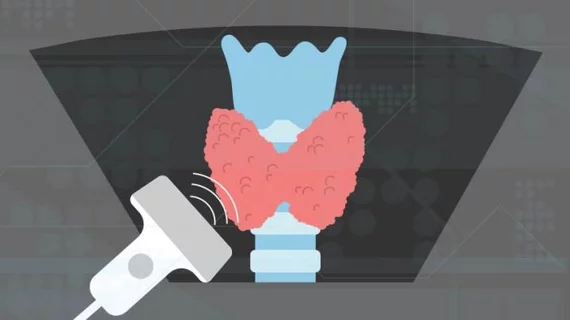One-third of physicians order thyroid ultrasounds unsupported by clinical guidelines
About one-third of physicians order thyroid ultrasounds in situations not supported by clinical guidelines, according to a study published Wednesday. Researchers said enhanced recommendations and patient discussions are needed to remedy the problem.
That’s the takeaway from Michigan Medicine clinicians, who surveyed more than 600 surgeons, endocrinologists and primary care physicians involved in thyroid cancer care. When presented with different patient scenarios, 33% said they utilized ultrasound for reasons not backed up by consensus protocols, such as the Choosing Wisely Campaign.
Although an “overwhelming” majority did request guideline-adherent imaging, too many physicians are still ordering unnecessary exams, the Ann Arbor, Michigan, group explained Aug. 12 in JAMA Surgery.
“This study is the first to look at why physicians are using thyroid ultrasound for patients,” senior author, Megan R. Haymart, MD, a distinguished endocrinology research professor of thyroid cancer at the institution, said in a statement. “While often it's for clinically relevant reasons, a substantial number of physicians are not ordering them for reasons that are clinically supported.”
As part of their research, Haymart et al. presented doctors with different situations and asked when they would schedule a thyroid or neck ultrasound. About 70% said they had read at least one of two well-known thyroid cancer guidelines from the American Thyroid Association or National Comprehensive Cancer Network.
Most ordered exams were supported by these recommendations, such as for a large nodule that can be felt or one viewed on additional imaging. For 33% of PCP’s, however, ultrasound was ordered at a patient’s request, while 28% cited abnormal thyroid function test results as the primary factor. The latter goes directly against Choosing Wisely suggestions.
The researchers said there is an opportunity in future guidelines to “look a little upstream” before clinical diagnosis in order to enhance guidance. Haymart and colleagues also suggested patients be brought into the loop during the decision-making process.
“There's so much emphasis in medicine on patient satisfaction. You do want patients to be satisfied, but physicians also have to do what's medically appropriate," she added. "Developing decision aids could help patients understand and decide when thyroid ultrasound is appropriate and when it's not."

